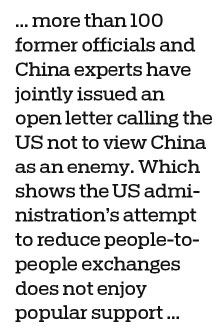Fostering a new balance in Sino-US ties
The "contraction" trend is becoming increasingly prominent in the United States' foreign policy thanks to its "America first" approach. Once the major provider of global public goods, the US is becoming a penny-pinching country focused solely on its national interests and thus weakening its international leadership.
Yet despite the contraction of its diplomacy, the US has gone on the offensive on particular issues, trade being the most prominent. Launching trade wars against nearly all major economies such as China, the European Union and Japan, the White House is using the trade brawls to appeal to the US leader's base even though tariff-slapping at will, and without any reason, goes against established trade practices and the World Trade Organization's rules.

Besides, the US administration has shown an inclination toward revisionism on the Taiwan question, with a number of pro-Taiwan officials holding key decision-making positions in the US. The US leader's phone call to Taiwan leader Tsai Ingwen and his statement to substantially improve "US-Taiwan relations", together with the US' other provocative moves including sailing aircraft carriers through the Taiwan Straits and endorsing laws such as the Taiwan Travel Act and Asia Reassurance Initiative Act of 2018 are all aimed at checking the Chinese mainland's rise.















